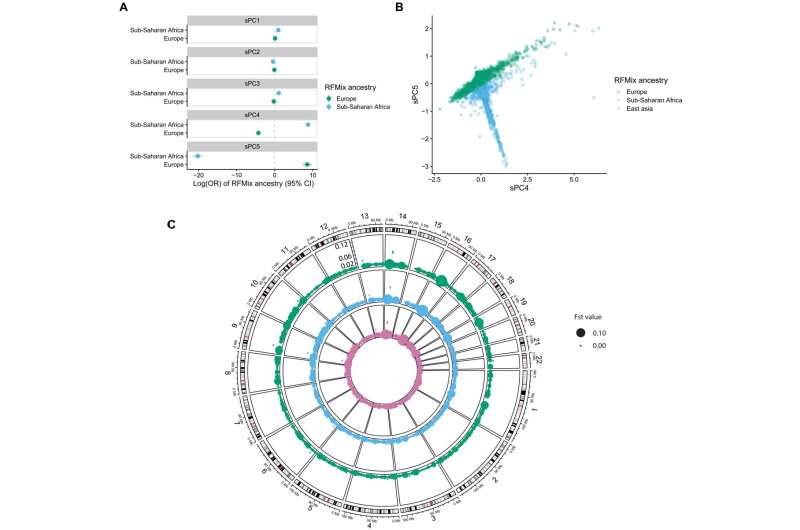May 1, 2023 report
This article has been reviewed according to Science X's editorial process and policies. Editors have highlighted the following attributes while ensuring the content's credibility:
fact-checked
peer-reviewed publication
trusted source
proofread
Somatic mutations with inherited germline variation discovered

A team of 87 researchers from multiple institutions led by the University of Michigan School of Public Health have published a paper in Science Advances—"The genetic determinants of recurrent somatic mutations in 43,693 blood genomes"—which challenges some long-held assumptions about non-oncogenic somatic mutations.
The group analyzed 43,693 blood sample whole genomes from 37 cohorts and identified 7,131 non-missense somatic mutations that are recurrently mutated in at least 50 individuals. According to the researchers, these recurrent non-missense somatic mutations (RNMSMs) are not clearly explained by other clonal phenomena, such as clonal hematopoiesis.
Somatic mutations are slight variants in genes that are acquired in life after birth. They are common in all animals and usually pose a low pathological risk unless they occur in a functional protein. Somatic mutations are, by definition, mutations that do not affect sex cells, so they are not inheritable.
RNMSM prevalence was found to increase with age, as might be expected, with an average 50-year-old having 27 RNMSMs. What may not be expected is an inherited germline variation associated with RNMSM acquisition. These variants were found in genes involved in adaptive immune function, proinflammatory cytokine production, and lymphoid lineage commitment. The researchers also found eight RNMSMs associated with blood cell traits at effect sizes comparable to Mendelian genetic mutations.
The authors state that non-oncogenic somatic mutations are thought to be uncommon and inconsequential, having little to do with cellular function, as they do not alter proteins or cause pathology. However, researchers found that somatic mutations in the blood are an unexpectedly common phenomenon with ancestry-specific determinants and human health consequences.
The non-coding variant sites positively associated with blood cell traits are particularly interesting. Since these are not thought to contribute to traits or pathology, these changes have gone unnoticed and, therefore, unstudied in possible relation to disease manifestation.
The authors' findings of a class of genetic variation, widely present throughout the human genome, with germline genetic determinants and phenotypic consequences directly refute what was previously assumed but never studied.
More information: Joshua S. Weinstock et al, The genetic determinants of recurrent somatic mutations in 43,693 blood genomes, Science Advances (2023). DOI: 10.1126/sciadv.abm4945
© 2023 Science X Network




















